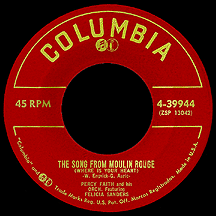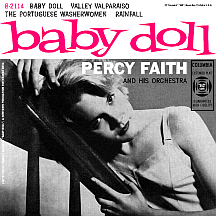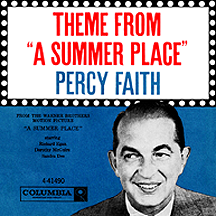PERCY FAITH
The "Beautiful Music" radio format began popping up on the FM band in the late 1950s, targeting adult listeners who actually owned FM radios and enjoyed listening to instrumental, mostly-orchestral background music in clean stereo fidelity. Also referred to as "elevator" music (a trend from some years earlier meant to soothe the nerves of lift-riders in multiple-story buildings) or "Muzak" (which was itself a 1930s precursor to the format heard in department stores, hotels and offices rather than on radio consoles), viable terms in an era (radio's first half-century or so) when unobtrusive non-vocal melodies were extremely popular. This type of music wasn't intended to be confused with 18th-century classical or 19th-century romantic era symphonies (to the great but mostly-deceased master composers, such an error would be blasphemy!); nevertheless, it was a common mistake many people made. One can understand the reason behind such a misconception, as few pop songs of the 20th century were exempt from being adapted into sweet-stringed, faux-classical commercial opuses. Composer-conductor Percy Faith was initially one of a handful of arrangers with the necessary mindset, talent and tenacity to successfully reimagine existing musical works in a variety of ways.
Percy was born and raised in Toronto, Ontario in a non-musically-inclined family, but his mother wanted to change the situation and urged him to take up an instrument. He started playing violin at the age of seven, but decided the difficulty of holding it, the margin of error in hitting the proper notes and the smell of rosin were all reasons to abandon the pesky neck-stiffener. With a piano, he could "plop" his fingers onto the keys and get the right note most of the time...so three years into the process, with mom's approval, he began taking piano lessons. His skills developed quickly; in 1919, when he was eleven, he got a job accompanying silent films on piano at the Iola Flicker Theatre in East Danforth on Toronto's east end, a stone's throw from Lake Ontario. Shortly afterwards he began attending the Toronto Conservatory, studying under top-rate music professors Louis Waizman and Frank Wellman. When he was 15, in 1923, Percy made his concert debut at Toronto's 3500-seat Massey Hall.
Things were going along nicely as his 18th birthday came around in 1926 until an accident altered the direction of his music career. His unattended three-year-old sister Gertrude set heself on fire while playing with matches and Percy, the only other person present, burned both of his hands while putting out the flames. They both recovered, though he spent nine months with bandaged hands, a situation he didn't find too upsetting, since it gave him a break from playing piano every single day (mom and his piano teacher, on the other hand, feared he would give it up completely). During this time he studied harmony and composition; while his career as a concert soloist might be kaput, he could certainly manage well enough to sit at the piano and compose melodies! Before long he was dreaming up full orchestral productions without even sitting at a keyboard. Teachers offered pointers on how he could put compositions on paper straight out of his head without a physical instrument, a skill that was to come in very handy, as it sped up the process...and he would one day need the speed.
Creating smooth orchestral sounds using mostly stringed instruments became Percy's forté, putting him two to three decades ahead of the "beautiful music" curve. He made the most of this time, initially taking advantage of the new medium of radio in 1927 as an arranger for Simpsons' Opera Hour on CKCL in Winnipeg, Manitoba. He was leading his own orchestra as early as 1931 and worked for the Canadian Radio Broadcasting Commission (CRBC, the country's first public radio network) through 1935. By the end of the decade he was the staff conductor and arranger for the newly-established Canadian Broadcasting Corporation (CBC). You might say he took on the role of super-conductor with his weekly program Music by Faith (which began in 1938), arranging fresh new selections every seven days for each part of his 30-piece orchestra. Despite a tight budget, he managed to hire a female vocal trio for five dollars apiece, but not to sing lyrics per se. Their contribution was a little like wordless coloratura singing infused with vocalese ad-libs, giving the musical numbers an obvious "human touch." Then three of their girlfriends joined in and the result was a complex "special effects sextet" that gave the broadcasts a sound like no other.
In the U.S., Music by Faith was carried by the Mutual Network and scored high ratings until the CBC cut the budget further and, late in 1940, canceled it for no apparently logical reason. Until that time he'd ignored offers from below the border but suddenly took them seriously despite his aversion to the shameless, over-the-top sponsorships of U.S. shows as compared to more subtle Canadian standards. By year's end he was in Chicago doing The Carnation Contented Hour on the NBC network, though the trade-off to making far more money was that he lacked the freedom he'd had in Canada. Innovation was his nature and being unable to take different approaches with orchestral arrangements would be difficult, yet Percy was still with the show when it relocated to NBC's New York studios in early 1946. The following year he signed on as music director for CBS radio's Coca-Cola-sponsored program The Pause That Refreshes.
Opportunities to work for some of the top bandleaders (Tommy Dorsey, Paul Whiteman) came to naught as he preferred taking his own path. Percy made records for the first time in 1944, intent on stamping each with his trademark sound; nothing too trendy, in the hopes the recordings might still appeal to consumers after many years. Early efforts were for Decca, during which time he indulged his affinity for Latin rhythms with a four-disc, eight-track album Fiesta Time. He made several recordings for the Majestic label around 1948, then moved to RCA Victor in '49, cutting a dozen sides including "Oodles of Noodles," a tune from the '30s made famous by Jimmy Dorsey; Faith's version was frequently heard in Chicago on TV commercials for a Hudson automobile dealership owned by entrepreneur and eventual billionaire Jim Moran.
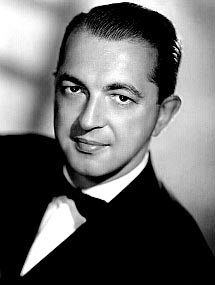
In 1950, Faith found permanent digs in New York City with Columbia Records; Mitch Miller (who'd only recently come from Mercury to take over Columbia's artists and repertoire division) appointed him musical director, a deal that granted unlimited freedom as a recording artist while also saddling him with a "side job" he wasn't keen on, that of choosing and arranging potential hit records for the label's lineup of "rookie" (as Percy called them) recording artists. Russ Emery was one such newcomer, his brief career highlighted by a vocal credit on Faith's first hit, "I Cross My Fingers," top 20 in the summer of 1950. The follow-up, "All My Love" (also known as "Bolero," it was a much bigger hit at the time for Patti Page), left the vocals to a chorus and was also a top 20 seller.
"My Heart Cries for You" was composed by Faith, though he was embarrassed by the song and used a pseudonym, Peter Mars (taken from the names of his children, Peter and Marilyn), for the credit; Carl Sigman wrote the lyrics. Mitch suggested he offer it to longtime Columbia star Frank Sinatra, who wasn't the least bit impressed. So it became the bone he threw, with low expectations, to recent signee Guy Mitchell; a breakthrough for Guy, it reached number two on the national charts in the early weeks of 1951. After that, the main objective was to turn more of Columbia's vocal hopefuls into major stars, an ongoing project that went very well. Sarah Vaughan, one of Percy's favorite singers, made a middling top 30 showing with "These Things I Offer You (For a Lifetime)" while his chorus-backed arrangement of folk music standard "On Top of Old Smoky" provided featured vocalist Burl Ives with his biggest hit to date.
Rosemary Clooney's career exploded in the summer of '51 with "Come On-a My House," featuring prominent harpsichord by Connecticut-born Stan Freeman, a provocative novelty tune that became Rosie's first number one smash. Meanwhile Tony Bennett, who'd struggled in his first year with the label, was in desperate need of a hit to avoid being cut from the label's roster. Faith came up with two songs, "Because of You" and the Hank Williams C&W hit "Cold, Cold Heart," which consecutively locked up the number one spot on the singles charts from late August through early December. Near the end of the year, P.F. put together a throwback to the vocalese arrangements he'd done on radio more than a decade before, as he preferred skipping the lyrics of well-known hit songs. Percy Faith's Magic Voices floated through the air in 1951 with "Dizzy Fingers." He'd long been fixated on female vocal-enhanced arrangements and continued to make these types of recordings for many years.
In 1952, Faith got to thinking it might be a good idea to set an exotic piece of music to an already-proven gimmick. A longtime fan of Latin American music, he was thrilled to discover "Delicado" (Portuguese translation: delicate), written and recorded for Decca in 1950 by Brazilian guitarist Waldyr Azevedo, a musician who excelled at choro, a musical movement begun more than 50 years earlier in Rio de Janeiro. Mitch suggested he have Freeman play harpsichord (just like on Clooney's hit) in place of the guitar lead; in July '52, the song became Percy's first record to reach number one.
One of the biggest hits anyone had during the '50s ruled the charts from May 'til August 1953, and it happened to be by Percy Faith, once again going against his preference for instrumentals and working with a vocalist. French composer Georges Auric's "The Song from Moulin Rouge" (made famous in the Oscar-winning film directed by John Huston and starring Clooney's husband, Jose Ferrer) was rejected by several New York music publishers, primarily for its length (90 bars, about three times as long as a typical three minute pop song). Faith rearranged and rewrote the piece (the original title, "It's April Again," was changed to "Where is Your Heart," with new lyrics by former Broadway songwriter William Engvick), shortening it considerably into a 32-bar arrangement he felt might at least get some radio airplay. Auric was appalled by the changes and refused to grant them the rights to edit it so severely. But Mitch liked what Percy had done and told him to record it anyway.
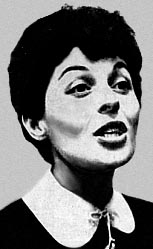
32-year-old Felicia Sanders (real name Felice Schwartz) of Mount Vernon, N.Y. had been singing for years on radio programs and with lesser-known bands. She developed an act with her pianist husband Irving Joseph arranging all the music and had recently been signed to Columbia after celebrity clubgoers began taking notice during a stint at Hollywood's Café Gala. She provided the vocal for "Where is Your Heart," then stood back and watched the recording spend ten weeks at number one. Suddenly composer Auric had no further complaints. Felicia, on the other hand, would have been within her rights to demand a bonus check, as she'd been paid musicians' scale for one session. While never at a loss for offers to work the clubs, she struggled to follow up her million-seller and had just one other top 30 hit two years later: "Blue Star," the theme from Medic, an NBC-TV drama series starring Richard Boone. Sanders also did some acting and had a recurring role on NBC's daytime soap The Doctors for several weeks in 1970.
Composing film music was an area Percy hadn't ventured into until 1955 when he and MGM musical director George Stoll collaborated on the score of Love Me or Leave Me starring Doris Day and James Cagney. They received Oscar nominations for the effort; it was Stoll's seventh (he'd won once) and Faith's first and only. Never content to stay idle, Percy returned to his radio roots, conducting the orchestra on the CBS network's Woolworth Hour from 1955 to '57. He arranged Johnny Mathis's 1958 album Merry Christmas while the arrival of stereo sound suggested a multitude of new ways to present his music. Max Steiner's instrumental theme from the late-'59 film A Summer Place turned the romantic spotlight on young stars Sandra Dee and Troy Donahue. Percy's recording of the song unexpectedly took radio by storm in early 1960, spending nine weeks at number one on the charts, the year's biggest hit single. "(Theme from) A Summer Place" received four Grammy nominations and won the top award, Record of the Year, the first of only two instrumentals ever to win in the category (fans of Herb Alpert are quite familiar with the other).
There were many other single releases through the years but only one more top 40 hit, "Theme for Young Lovers" (Percy's own composition), later in '60. He moved permanently to Los Angeles and provided the music scores for a handful of Hollywood pictures between '61 and '66: Tammy Tell Me True, The Devil's Children, I'd Rather Be Rich, The Third Day, The Oscar and documentary The Love Goddesses in addition to the theme and score for NBC's long-running western series The Virginian starring James Drury. Albums became the main method for consuming his music, as he put his own stamp on movie themes, covers of major hits, Latin canciónes, folk music, exotica, instrumentals with vocalese highlights, romantic mood music and holiday fare (1966's "Christmas Is...," a Faith original penned with Spence Maxwell, being a peak of his later career). It was a fabulous time for Faith, one of the kings of the popular "Middle of the Road," "Easy Listening" and "Beautiful Music" radio formats. His second Grammy came in 1970 with "(Love Theme from) Romeo and Juliet." While Henry Mancini had the hit single (and won a Grammy for it as well), Faith's nod came in the category Best Contemporary Performance by a Chorus.
Felicia Sanders, the singer who'd made a name for herself with the chart-topping "Song from Moulin Rouge," was just just 53 when she died of cancer in February 1975. Twelve months later Percy Faith, who'd released albums for Columbia Records an average of one every three months from 1953 through 1975, succumbed to cancer at age 67, just as his disco-style "Summer Place '76" had finished a ten-week run on the Easy Listening singles charts.
NOTABLE SINGLES:
- Star Dust - 1946
- Oodles of Noodles - 1949
- I Cross My Fingers - 1950
with Russ Emery - All My Love - 1950
- On Top of Old Smoky - 1951
by Percy Faith with Burl Ives - Dizzy Fingers - 1951
with the Magic Voices - Delicado - 1952
- The Song from Moulin Rouge (Where is Your Heart) - 1953
by Percy Faith featuring Felicia Sanders / - Swedish Rhapsody - 1953
- Return to Paradise - 1953
- Valley Valparaiso - 1956
- We All Need Love - 1956
- With a Little Bit of Luck - 1956
- Till - 1957
- (Theme from) A Summer Place - 1960
- Theme For Young Lovers - 1960
- Sons and Lovers - 1960
- (Theme from) The Dark at the Top of the Stairs - 1960
- The Sound of Surf - 1963
- Christmas Is... - 1966
- Yellow Days - 1967
- Crunchy Granola Suite - 1973
- Summer Place '76 - 1975


